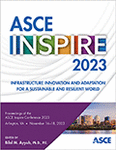Potential for Achieving Post-Disaster Functional Recovery for Existing Buildings: Lessons from Earthquakes for Other Hazards
Publication: ASCE Inspire 2023
ABSTRACT
This paper describes a study that assesses the functional recovery performance of existing buildings in earthquakes, exploring opportunities to improve post-earthquake building function through seismic retrofit. The results show that life safety retrofits can significantly improve functional recovery, but also may not. Rather, direct consideration of building function can be used to identify retrofit solutions that lower function disruption as well as life safety risks. The paper also describes qualitative research conducted to define the barriers and opportunities to achieving functional recovery seismic performance for existing buildings. The barriers include costs and a lack of guidelines to inform building design for functional recovery. However, functional recovery goals have significant alignment with sustainability upgrades and other owners’ goals, presenting an opportunity. These barriers and opportunities provide insights into research needs and changes in building practices that can support functional recovery after climate hazard events, which are described in the final section.
Get full access to this article
View all available purchase options and get full access to this chapter.
REFERENCES
Collins, B. (1995). Chatsworth: Post Office Repaired, Set to Reopen Sept. 5.
Cook, D. T., et al. (2022). “A framework for operationalizing the assessment of post-earthquake functional recovery of buildings.” Earthquake Spectra. 38(3).
Echeverria, M. J. (2023). Seismic Fragility Assessment, Retrofit and Functional Recovery of Reinforced Concrete Wall Buildings. PhD Dissertation, Univ of Colorado Boulder.
Echeverria, M. J., et al. “Achieving Functional Recovery through Seismic Retrofit of Existing Buildings: Barriers and Opportunities”. Journal of Performance of Constructed Facilities, 37(4).
FEMA. (2018). Seismic Performance Assessment of Buildings: Volume 1- Methodology (FEMA P-58) Federal Emergency Management Agency, Washington, DC.
FEMA. (2021). Recommended Options for Improving the Built Environment for Post-earthquake Reoccupancy and Functional Recovery Time.
Leech, N. L., and Onwuegbuzie, A. J. (2007). “An array of qualitative data analysis tools: A call for data analysis triangulation.” Sch. Psychol. Q. 22 (4): 557–584.
Liel, A., and Kersting, R. (2023). “Preliminary Design Criteria for Functional Recovery of Buildings” Canadian Conf in Earthquake Eng – Pacific Conf in Earthquake Eng.
Logan, T. M., and Guikema, S. (2020). “Reframinig Resilience: Equitable Access to Essential Services”. Risk Analysis, (40)8.
Marquis, F., et al. (2017). “Understanding Post-Earthquake Decisions on Multi-Storey Concrete Buildings in Christchurch, New Zealand.” Bulletin of Earthquake Eng, 15(2).
Mohammadgholibeyki, N. (2023). Evaluating Post-Earthquake Functional Recovery of Critical Buildings Accounting for Lifelines’ Restoration. PhD Dissertation, Texas A&M Univ.
Molina Hutt, C., Vahanvaty, T., and Kourehpaz, P. (2022a). An analytical framework to assess earthquake-induced downtime and model recovery of buildings. Earthquake Spectra 38(2).
Molina Hutt, C., et al. (2022b). Toward functional recovery performance in the seismic design of modern tall buildings. Earthquake Spectra, 38(1).
Porter, K. (2016). “Not Safe Enough: The Case for Resilient Seismic Design.” In Proc., 2016 SEAOC Convention, 12–15.
Potter, S. H., Becker, J. S., Johnston, D. M., and Rossiter, K. P. (2015). “An overview of the impacts of the 2010-2011 Canterbury earthquakes.” International Journal of Disaster Risk Reduction, 14.
Terzic, V., and Villanueva, P. K. (2021). “Method for probabilistic evaluation of post-earthquake functionality of building systems.” Engineering Structures 241.
UNISDR. (2011). Global Assessment Report on Disaster Risk, United Nations, Geneva. https://www.preventionweb.net/english/hyogo/gar/2011/en/home/executive.html.
Information & Authors
Information
Published In
History
Published online: Nov 14, 2023
ASCE Technical Topics:
- Buildings
- Business management
- Construction engineering
- Construction methods
- Disaster risk management
- Disasters and hazards
- Earthquake engineering
- Earthquakes
- Engineering fundamentals
- Existing buildings
- Geohazards
- Geotechnical engineering
- Natural disasters
- Practice and Profession
- Public administration
- Public health and safety
- Rehabilitation
- Safety
- Seismic effects
- Seismic tests
- Structural engineering
- Structures (by type)
- Tests (by type)
Authors
Metrics & Citations
Metrics
Citations
Download citation
If you have the appropriate software installed, you can download article citation data to the citation manager of your choice. Simply select your manager software from the list below and click Download.
